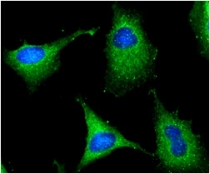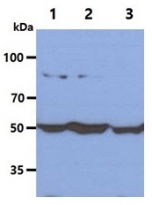ARG57097
anti-G6PD antibody [2F6]
anti-G6PD antibody [2F6] for ICC/IF,Western blot and Human
Overview
| Product Description | Mouse Monoclonal antibody [2F6] recognizes G6PD |
|---|---|
| Tested Reactivity | Hu |
| Tested Application | ICC/IF, WB |
| Host | Mouse |
| Clonality | Monoclonal |
| Clone | 2F6 |
| Isotype | IgG2b, kappa |
| Target Name | G6PD |
| Antigen Species | Human |
| Immunogen | Recombinant fragment around aa. 35-506 of Human G6PD |
| Conjugation | Un-conjugated |
| Alternate Names | G6PD1; G6PD; EC 1.1.1.49; Glucose-6-phosphate 1-dehydrogenase |
Application Instructions
| Application Suggestion |
|
||||||
|---|---|---|---|---|---|---|---|
| Application Note | * The dilutions indicate recommended starting dilutions and the optimal dilutions or concentrations should be determined by the scientist. |
Properties
| Form | Liquid |
|---|---|
| Purification | Purification with Protein G. |
| Buffer | PBS (pH 7.4), 0.02% Sodium azide and 10% Glycerol. |
| Preservative | 0.02% Sodium azide |
| Stabilizer | 10% Glycerol |
| Concentration | 1 mg/ml |
| Storage Instruction | For continuous use, store undiluted antibody at 2-8°C for up to a week. For long-term storage, aliquot and store at -20°C. Storage in frost free freezers is not recommended. Avoid repeated freeze/thaw cycles. Suggest spin the vial prior to opening. The antibody solution should be gently mixed before use. |
| Note | For laboratory research only, not for drug, diagnostic or other use. |
Bioinformation
| Database Links |
Swiss-port # P11413 Human Glucose-6-phosphate 1-dehydrogenase |
|---|---|
| Gene Symbol | G6PD |
| Gene Full Name | glucose-6-phosphate dehydrogenase |
| Background | This gene encodes glucose-6-phosphate dehydrogenase. This protein is a cytosolic enzyme encoded by a housekeeping X-linked gene whose main function is to produce NADPH, a key electron donor in the defense against oxidizing agents and in reductive biosynthetic reactions. G6PD is remarkable for its genetic diversity. Many variants of G6PD, mostly produced from missense mutations, have been described with wide ranging levels of enzyme activity and associated clinical symptoms. G6PD deficiency may cause neonatal jaundice, acute hemolysis, or severe chronic non-spherocytic hemolytic anemia. Two transcript variants encoding different isoforms have been found for this gene. [provided by RefSeq, Jul 2008] |
| Function | Catalyzes the rate-limiting step of the oxidative pentose-phosphate pathway, which represents a route for the dissimilation of carbohydrates besides glycolysis. The main function of this enzyme is to provide reducing power (NADPH) and pentose phosphates for fatty acid and nucleic acid synthesis. [UniProt] |
| Highlight | Related news: Disulfidptosis markers; |
| Calculated MW | 59 kDa |
| PTM | Acetylated by ELP3 at Lys-403; acetylation inhibits its homodimerization and enzyme activity. Deacetylated by SIRT2 at Lys-403; deacetylation stimulates its enzyme activity. |
Images (2) Click the Picture to Zoom In
-
ARG57097 anti-G6PD antibody [2F6] ICC/IF image
Immunofluorescence: HeLa cells line stained with ARG57097 anti-G6PD antibody [2F6] at 1:100 (Green).
DAPI (Blue) for nucleus staining.
-
ARG57097 anti-G6PD antibody [2F6] WB image
Western blot: 40 µg of 1) MCF, 2) HeLa, and 3) Jurkat cell lysates stained with ARG57097 anti-G6PD antibody [2F6] at 1:1000.







